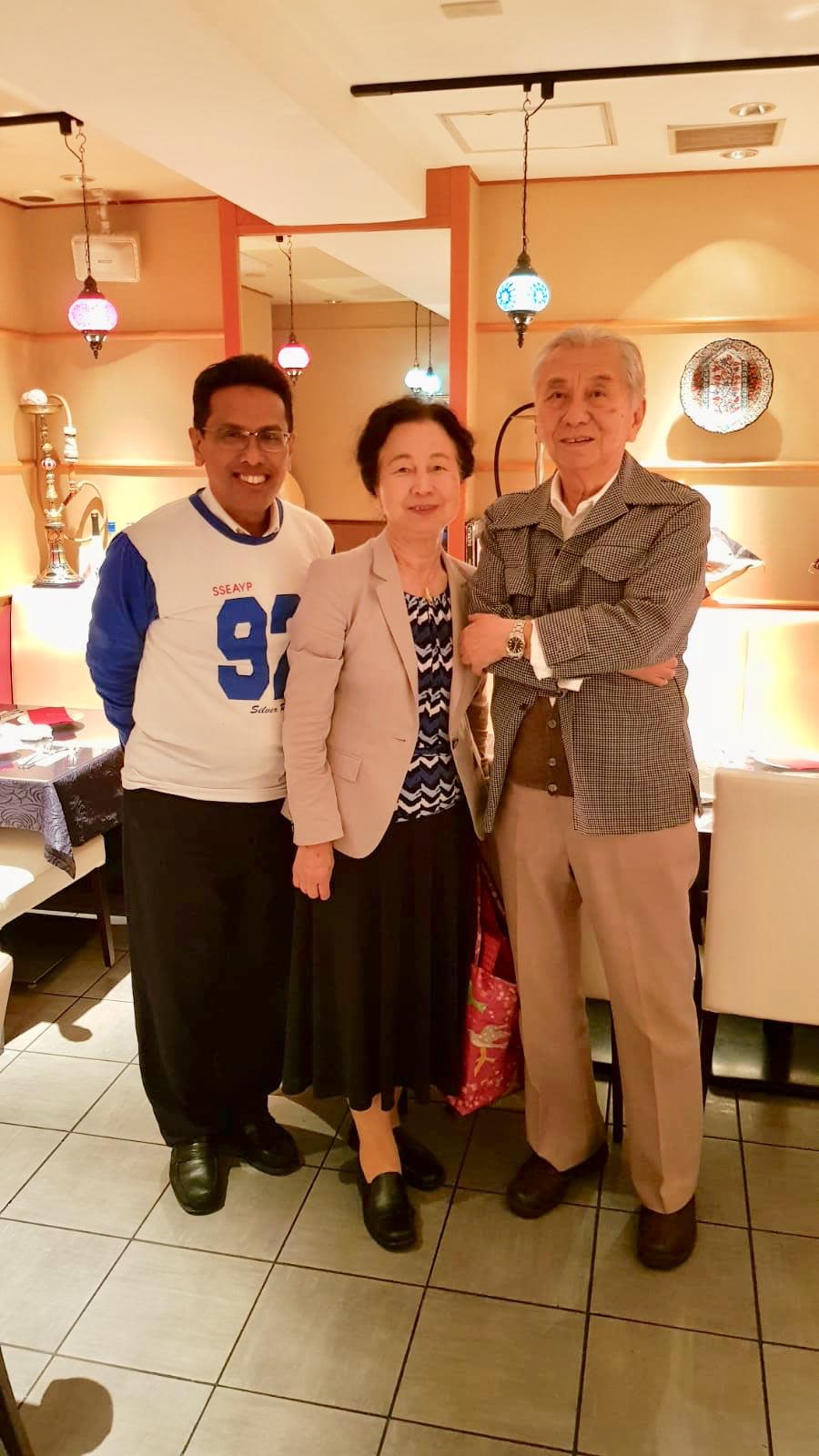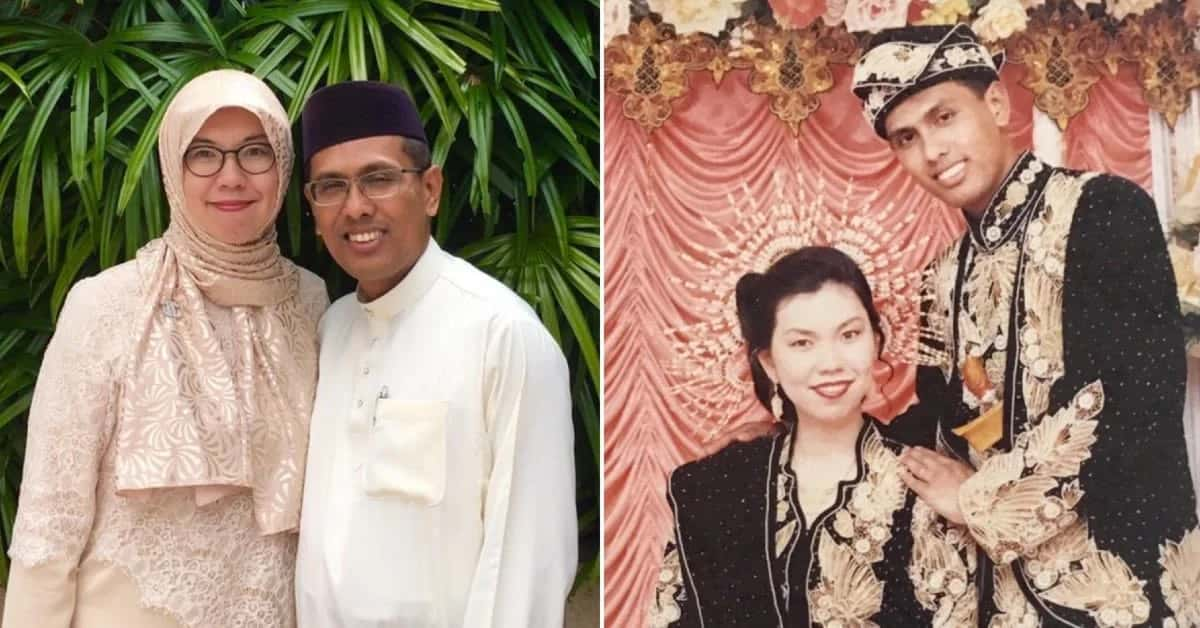[Updated 6 May 2020]
Every now and then, we'll read stories of Muslim reverts' inspiring journey in finding Islam or their spiritual reflections during the month of Ramadhan. While learning about Japanese-Muslim reverts who are living in Singapore, we had the opportunity to interview Keiko Soeda who has been married to her Singaporean Malay husband, Yacob Hussain for 25 years ❤️
Their paths crossed when they were both on the Ship for Southeast Asian Youth Programme (SSEAYP) where Keiko boarded in 1991 and Yacob in 1992. While completing their Master's at the National University of Singapore, their friendship blossomed but not without its set of challenges when their cultures and faiths come together. We got to ask Keiko a few questions about her interracial marriage, the challenges she faced as a Japanese-Muslim revert, and how her husband plays a vital role in her journey of embracing Islam for the past 26 years ❤️
1. Tell us about your journey together thus far

Keiko Soeda and her husband, Yacob Hussain
Our journey has been a blessed one, alhamdulillah, by the mercy of the All-Mighty, but we have had our fair share of ups and downs as any normal couples would experience. That’s normal. We are really fortunate that we can talk things through if we are met with challenges or disagreement.
2. How did you first come to embrace Islam? What was it about the religion that made you want to convert?
Well, I studied different religions as part of my research for my Master’s Degree thesis at the National University of Singapore (NUS) and Islam was one of them. The concept of Islam was very natural, and it wasn’t different from any other religions except practical things like prayers or eating halal food. The teaching was almost similar to what my parents taught me since young.

Keiko and her Singaporean friends from the Ship for Southeast Asian Youth Programme (SSEAYP), the batch of 1991
Nowadays, there are many people who think Islam is difficult because of the obligatory prayers or restriction of certain food. Personally, I feel that we should not judge by the exterior because beauty lies within. Many things in life can appear ugly or beautiful or easy or difficult but what's inside is totally different.
Some of my close friends in Singapore (one of them was my future husband) have great character and humility, and I wanted to know what makes them who they are. My parents always taught me to look inside and not to judge a book by its cover. Therefore, I always believe that, whether you like it or not, we're the ones who change or endorse perception about certain things.

Keiko and her Japanese revert friends at Darul Aqram
When we get inspired by someone, we want to learn more about that person right? Whether its Mozart, Picasso, or even Taufiq Batisah, you'd really want to know what makes them who they are.
When I tried to get to know my future husband, I found out that Islam was essential to his daily life and his religion guided the values he held or why he acts the way he does. When you learn more about Islam, everything is interconnected with faith which I found very beautiful ?
I was also fascinated by the Qur'an where the words in it never changed and were preserved from the very start. For me, it was simply out of this world! From there, I read and learn more about the Qur'an and gradually discovered that it had solutions to my challenges and answers to my questions. I am still slowly discovering more of its beauty and wisdom, and it's certainly a humbling experience. Singapore is very fortunate to have many accredited Ustazs and Ustazahs whom we can always ask questions too.
3. What were the reactions of your family and close friends when you wanted to be a Muslim?
I didn’t formally inform them as I thought being a Muslim won't change who I was (partly because I didn’t wear a hijab then). Somewhere in my heart, I also wanted them to know that even though I became a Muslim, I am still who I am: their daughter and a Japanese.
However, there is always this absurd perception, not only with family but with friends, that when you marry someone from a different race or religion, you lose your own culture, personality and identity.

Keiko's husband Yacob [far left] with her parents in Japan.
Coming from a traditional Japanese family, we don’t express certain things directly, especially to our parents. But somehow, my parents and I have a mutual understanding and respect about certain things without saying anything - we just let it sink in. My parents knew (about my conversion to Islam) eventually and were okay with it as they were assured that I'll still be who I am and I'll always be their daughter. Hopefully, a better one now.
4. What were the challenges you faced when you first reverted to Islam? Did you ever feel like giving up?
I reverted a year before I got married as I didn’t want to give up my faith if my marriage life didn’t go as planned, but alhamdulillah we celebrated 25 years as a married couple. May Allah continue to bless our marriage, Insya Allah. And I have been a revert for 26 years ?

My challenges were more about the perception people had about Muslims. When I tell them that I'm a Muslim, they no longer see me as Keiko. And in Southeast Asia, if you are a Muslim, people always think you are a Malay. This was a rather new encounter for me as I'm proud to be Japanese. The idea that people thought otherwise, just because I became a Muslim, was rather difficult to digest.
Now that I understand the geographic and historical background of race and religion in Southeast Asia, I don’t blame people for thinking like that. So what I did then and I still do, is to demonstrate that I can be a very traditional Japanese and yet be a Muslim in my best capacity through my character and doings.
5. How did your husband help you navigate the process of embracing Islam, and do you have advice for others in a similar position on how they can be helpful to partners that are converting?
My husband was very supportive in a way that he introduced Darul Arqam and bought books for me but never forcing me into anything. He would make a recommendation but he would always respect my decision on certain things. The most important and impressive thing about him was and still is, whatever he says, he will do it himself. It still surprises me.

For example, he would say, reading the Qur'an will make your heart soft and close to God and even it's just a few sentences or a page, we should read it every day. But as you know, when we are too busy (and we are in Singapore!), we tend to put reading Qur'an aside (guilty as charged!) but he makes sure he reads it and does it even though he's busy. By constantly doing it himself, it makes me want to do it too. Action speaks louder than words, and sort of like a Japanese samurai - just a few words, actions only.
He was and still is very open to my constructive criticism on certain topics or aspects about Islam. We like to discuss and sometimes, ended up in a heated discussion. But he would state his opinions and never underestimate or ridicule my criticism or being overprotective about his faith. In the end, when the answer comes naturally when attending classes or reading the book, he will be right most of the time… (And I am like 'Ahhhhh!')
6. What resources did both of you have to help you while you were in the process of conversion? Are there more resources for interracial couples nowadays?
Those days, Darul Arqam was the prominent place for us to get information in English. There were many teachers and fellow reverts encouraging each other, keeping in touch and setting up gathering after class. My Chinese Singaporean revert sisters, whom we studied together around 20 years ago, still gather once a month at our Chinese Ustazah’s house (She has taught many reverts at Darul Arqam).

Keiko [top left] with her Chinese revert friends and their teacher, Sister Shahirah. It's at Darul Aqram where they learned more about Islam
We went through singlehood, marriage and having children together. I think these gatherings, connection and communications strengthen our faith as well as our friendship. We also have Japanese Muslim gathering where we chit chat in Japanese and eat home-cooked Japanese food. The juniors also get to mingle, and we exchange information on education, fashion, new halal outlets and more! ?
Nowadays with YouTube, Facebook and all other internet platforms, like Have Halal, Will Travel, younger interracial couples can get many information and advice so that’s really great. Additionally, I think they should go out and have a conversation with other reverts or friends to get to know more about them as they may have similar challenges and can provide solutions and encouragements - whether culturally or religiously.
7. What were some cultural differences that you both faced in the first few years of marriage and how did you overcome them?
We attended so many Malay weddings when we first got married as my hubby has a very big family and many relatives. Our weekends were packed with either helping (cutting potatoes and carrots!) or attending weddings whom I had no idea whose wedding it was! I was really exhausted and I remember telling my hubby enough is enough. But now, I am like, there’s no wedding this weekend?

Keiko and her husband on their wedding day
As time goes by, I learn to adapt, go with the flow and realise when to let go. When I was young, I went all out to blend in with my hubby’s side as I wasn't sure what we should be doing or whether I was doing it correctly. Eventually, I get exhausted but with time, I learned to be myself in any situation and above all, get used to it.
8. What’s the most valuable thing that you’ve learnt about each other from your experience?
Communication is the key in interracial marriages. You should not assume or keep certain feelings to yourself as it may cause unnecessary stress or frustration to yourself and your other half. Marriage is a union of two cultures, so we are bound to have differences. We need to respect each other’s cultures and in the process, not going against our religion. Any questions about religion should be dealt with without being overprotective or too flexible. It's also important to ask for help or suggestions from those in similar situations.

Keiko [seated second from left] in her beautiful family photo
It's also essential to pray as a couple and family as much as possible because it really strengthens the relationship and it has blessings within it ❤️
9. Any advice for young couples who are going through the same obstacles?
In the Qur'an, it says that after every difficulty, there is ease. Every relationship is different and some succeed and some don’t, but you should go all out and try to overcome the obstacles one by one together knowing that there will be ease at the end. God Willing. If you don’t try, you won’t know right? ?
Note: All images are courtesy of Keiko Soeda.


